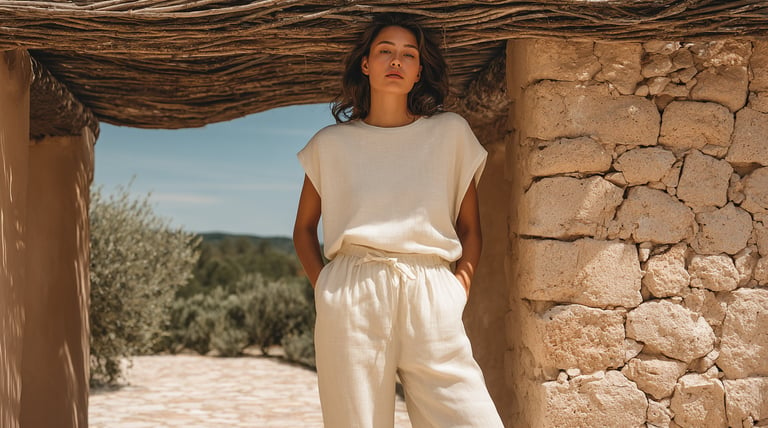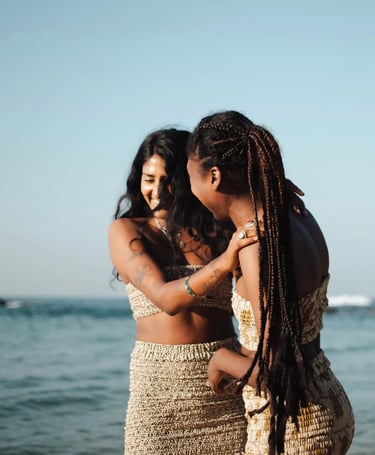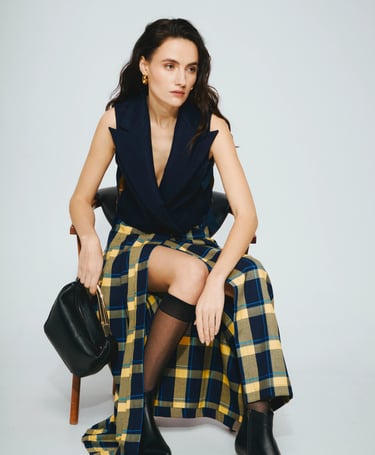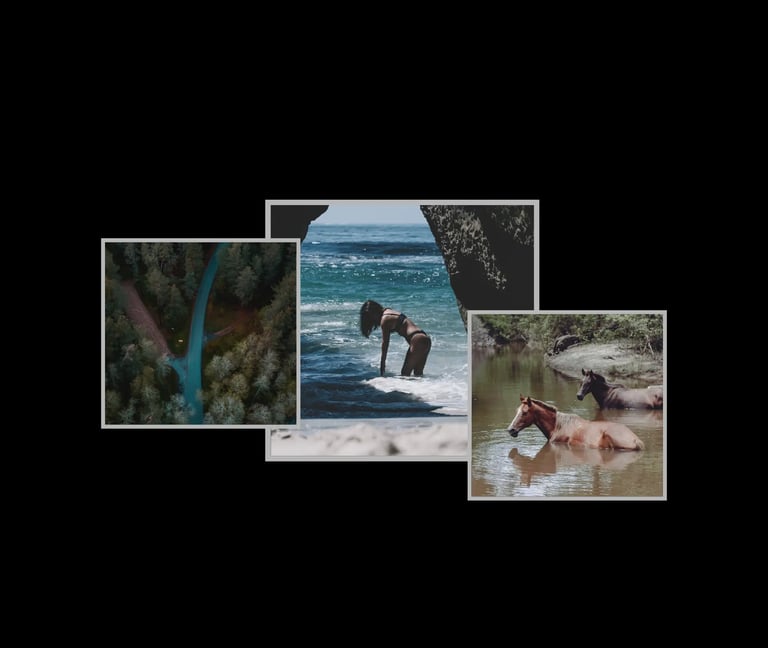The Rise of the Slow Brand: How a New Generation of Labels Is Rewriting Fashion’s Future
SUSTAINABILITY


Fashion has long been a story of acceleration. The past two decades have seen the rise of rapid-fire trend cycles, low-cost labour, and mass production on an industrial scale. The result? An industry that now produces over 100 billion garments every year, generating an estimated 92 million tonnes of textile waste and accounting for 10% of global carbon emissions. For years, speed equalled success. But increasingly, that equation no longer holds.
A quieter, more deliberate countercurrent is gaining strength - one that values time, craftsmanship, and consciousness. Across the globe, a growing number of independent designers are rejecting the disposability of fast fashion and building something different: a slower, more intentional model rooted in ethics and endurance. These "slow brands" aren’t simply sustainable alternatives; they represent a fundamental shift in what fashion aspires to be.
A Culture Tired of Fast
The speed of fashion has become impossible to ignore. On social media, microtrends now last mere weeks, with influencers cycling through aesthetics at algorithmic pace. Yet consumers are showing signs of fatigue. According to McKinsey, people buy 60% more clothing than they did 20 years ago - but keep each item half as long. Meanwhile, 73% of Gen Z say they’re willing to pay more for products that are made ethically and sustainably.
This generational shift isn’t just about guilt - it’s about value. In a world of excess, longevity has become luxury.
The Slow Brand Philosophy
Slow fashion is not just the opposite of fast fashion; it’s a reimagining of what makes something beautiful. It values process over profit, quality over quantity, and people over production quotas. Slow brands produce in small batches, work with ethical supply chains, and embrace natural materials that improve with wear.
More than anything, they design with intention. The goal is to create garments that outlive seasons - pieces you return to again and again, each wearing adding another layer to the story.
As one founder recently put it, "We don’t want to be everywhere. We just want to be enough."
Craftsmanship with a Conscience: Buffalo the Label
Founded in 2023, Buffalo the Label has quickly become a name synonymous with craftsmanship and care. Every piece is handmade from 100% cotton - a deliberate choice to ensure longevity and comfort. The brand’s silhouettes are timeless rather than trend-led, created to integrate seamlessly into wardrobes year after year.
Buffalo takes a thoughtful approach to waste. Each collection is cut using waste-minimising techniques, with offcuts repurposed into smaller accessories such as washbags and key charms. It’s a small act that symbolises a much larger philosophy: nothing should be disposable, not even the scraps.
But Buffalo’s most profound contribution may be social rather than environmental. Based on Sri Lanka’s south coast, the brand employs a team of women seamstresses who work flexibly - either from home or at the brand’s headquarters, which is within walking distance for most of them. Many of these women left factory jobs that demanded long hours and offered little pay; Buffalo gives them the freedom to work on their own terms while earning a sustainable income.
Founded by Lauren, a sustainable development advocate, and Jess, a UK-based seamstress, Buffalo is proof that a brand can grow internationally without sacrificing ethics or intimacy. It’s slow fashion in its purest form: community-driven, self-funded, and deeply human.


Quiet Refinement: Selera’s Modern Minimalism
Founded in 2020 by stylist Valeria Semchuk, Selera is built around a deceptively simple idea: that true style is timeless. The label releases limited capsule collections, each piece individually numbered - not as a marketing gimmick, but as a statement of rarity and permanence.
Selera’s commitment to sustainability is holistic. The collections are made using high-quality natural fibres such as nettle and hemp, alongside deadstock fabrics that give new life to materials otherwise destined for waste. Even the brand’s packaging reflects this ethos: biodegradable tags embedded with flower seeds turn the simple act of unboxing into one of regeneration. Plant your tag, and in a few weeks, marigolds or petunias bloom where waste might have been.
This kind of thoughtfulness defines Selera’s philosophy. The brand doesn’t chase novelty or seasonality. Instead, it invites consumers to slow down - to see each garment as part of a longer relationship between maker, wearer, and planet.


Effortless Longevity: W.two and the New Classic
In Notting Hill, sisters Lia and Georgia launched W.two out of a shared frustration with fashion’s obsession with newness. Their vision was simple: create pieces that could move seamlessly between seasons, cities, and moods - clothes that live life with you.
Their collections blend soft linens and structured tailoring, drawing inspiration from London’s energy and Mediterranean ease. These are garments meant to last - versatile staples that look as natural on the beach as they do on city streets.
At the heart of W.two is a belief that fashion should never come at the planet’s expense. The brand works to minimise waste, turning fabric offcuts into small, useful accessories. Each piece is designed to be worn again and again, building a wardrobe that evolves, rather than expands.
Their philosophy - "chic fashion that doesn’t cost the earth" - captures a mood that resonates widely. In an era of fleeting aesthetics, W.two’s quiet consistency feels like a relief.


Slow as a New Standard
What unites brands like Buffalo, Selera, and W.two is not a shared aesthetic but a shared refusal. They refuse to measure success by speed or volume. They refuse to treat clothing as disposable. They refuse to separate beauty from responsibility.
In doing so, they’re shaping a new narrative - one that prioritises purpose over pressure, and presence over production.
It’s tempting to see this as niche, but the numbers suggest otherwise. The global ethical fashion market is projected to double by 2030, reaching over $20 billion in value. The resale market, fuelled by the same conscious mindset, is growing three times faster than traditional retail. The slow movement, once marginal, is becoming mainstream.
Redefining Value
In this new landscape, luxury is being rewritten. It’s no longer defined by exclusivity or price tags, but by transparency, integrity, and intention. Owning less, but better, has become a badge of discernment - a quiet rebellion against waste.
Slow brands are not anti-growth; they simply reject the idea that more always means better. Their growth is measured in loyalty, trust, and time - the kind of capital that can’t be quantified on quarterly reports.
The Future Belongs to the Patient
Fashion, at its essence, has always been about storytelling. What slow brands are doing is reclaiming that story - returning to a rhythm where garments carry meaning, makers are visible, and consumption is considered.
As the climate crisis deepens and consumer awareness sharpens, this shift feels less like a trend and more like an inevitability. Fast fashion, for all its scale, belongs to a fading paradigm. The future belongs to the patient - to the brands willing to take their time, and to the consumers willing to wait.
The rise of the slow brand isn’t just a change in fashion; it’s a recalibration of values. It reminds us that clothing can be more than a product. It can be a relationship - between human hands, natural materials, and the stories we choose to wear.


